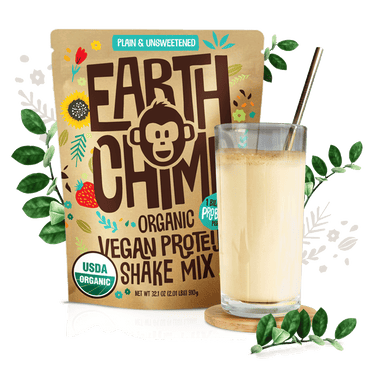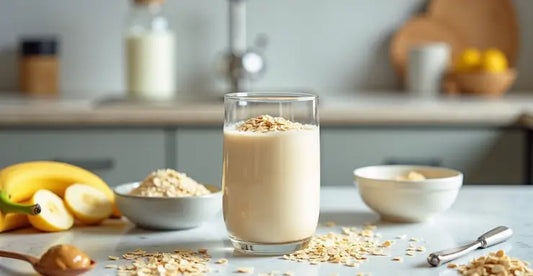If you’ve ever paused your workout routine and wondered whether to skip your protein supplement, you’re not alone. It might feel unnecessary, but having a protein shake on rest days can still support muscle tissue repair and overall wellness.
Rest days are not just about taking it easy. They play a critical role in rebuilding and strengthening muscles. Consuming protein during this time gives your body the essential macronutrient it needs to recover and grow, even without a post-workout session. Whether you're training regularly or simply staying active, understanding how protein supports your body during recovery is key.
In this article, we'll explore why protein intake on rest days matters, how it supports recovery, and how shakes can fit into your routine. We'll also touch on balancing shakes with whole foods and choosing a supplement that supports your goals.
Keep reading to learn how to fuel recovery properly and stay on track with your fitness goals even on your days off.
The Role of Protein in Muscle Recovery
Protein plays a vital role in supporting muscle recovery and overall health. It helps with tissue repair, hormone production, and maintaining a strong immune system. Once consumed, protein is broken down into amino acids, which serve as the building blocks for numerous functions in the body.
During resistance training or other intense physical activity, small tears occur in your muscle fibers. This is a natural and beneficial process that leads to muscle growth and repair. Your body responds by repairing these microtears, which helps muscles become stronger over time. That’s why getting enough protein on rest days is just as important as consuming it on workout days.
The recovery process continues well beyond your training session. Research shows that muscles remain highly responsive to protein for 24–48 hours after exercise. Our body needs a steady supply of this important macronutrient during this window to support repair and adaptation. Additionally, protein can support insulin response, which plays a role in delivering nutrients to muscle tissue during recovery.
Protein Needs for Active People
Everyone needs protein, but how much you need depends on how active you are. For a typical adult who isn’t very active, the recommendation is 0.8 grams of protein per kilogram of body weight each day. But this amount isn’t enough for athletes and active people.
If you exercise regularly, whether it’s lifting weights, running, or doing high-intensity workouts, you need more protein.
The recommended amount for active people is between 1.2 and 2.0 grams per kilogram of body weight per day. This is because exercise increases muscle protein breakdown, and you need more protein to repair and grow your muscles.
Benefits of Protein Shakes on Rest Days

Protein shakes can help you meet your protein goals, especially on rest days. Here are some benefits:
-
Meeting protein goals: If your regular meals don’t provide enough, drinking a protein shake can help maintain adequate levels of protein throughout the day, especially when muscle repair is still active.
-
Convenience: On busy days, shakes are a fast and efficient way to meet your intake of protein without having to prep or cook a full meal.
-
Weight management: If you're trying to lose weight, protein shakes can help preserve muscle mass during a calorie deficit. They typically contain fewer calories than full meals, making them a helpful option for controlling calorie intake.
-
Customization: You can enhance your shake with fruits, vegetables, or nut butter to boost its nutritional value and tailor it to your needs. This makes them highly adaptable.
-
Curbing cravings: Protein can spike feelings of fullness and help reduce unnecessary snacking, making it easier to stick to your plan and feel stronger during recovery.
Protein shakes can be a convenient and effective addition to your diet, but they aren't a substitute for natural foods. While they often contain essential amino acids, it's important to enjoy them as part of a balanced, nutrient-rich meal plan.
Timing Your Protein Intake
The timing of your shake on a rest day is less important than the total amount of protein you consume throughout the day. What matters most is maintaining consistent protein intake to support recovery. Starting your morning with a high-protein breakfast or spreading your protein sources evenly across meals can be just as effective.
Rest Day Nutrition and Recovery Strategies
What you eat and do on rest days is just as important as your workout routine. Proper nutrition and recovery habits help repair muscle tissue, support growth, and reduce the risk of overtraining.
Your rest day diet should include a balance of macronutrients:
-
Protein supports muscle recovery and repair. Keep your intake consistent to maintain progress, even when you're not training.
-
Carbohydrates help replenish glycogen stores. Good sources include whole grains, fruits, sweet potatoes, rice, and quinoa.
-
Fats play a role in reducing inflammation and keeping you satisfied after meals.
Hydration is just as important. Make sure to drink enough water to replace fluids lost during training and support muscle function.
Adding light movement, such as walking, stretching, or foam rolling, can promote circulation and reduce soreness. This type of active recovery can make a big difference in how your body feels the next day.
Some people include a "cheat meal" on rest days to stay motivated. While occasional treats can fit into a healthy lifestyle, be mindful of your total energy intake. Eating an extra 3,500 calories over time can lead to gaining one pound of body fat. If you're aiming to maintain or lose weight, staying within your energy needs is key.
Protein shakes can support your nutrition on rest days by filling in the gaps. A typical shake provides around 25–30 grams of protein and 200–300 calories, though that can increase depending on added ingredients. Many shakes also contain helpful nutrients like iron, B12, zinc, and niacin. Just remember that shakes work best when paired with whole food meals for complete nutrition.
Calorie Management and Protein Shakes
Protein shakes can help you meet your daily protein requirements, but it’s important to consider them within the context of your overall calorie intake. Consuming an extra 3,500 calories can result in gaining approximately one pound of body fat. If your goal is to lose weight, you'll need to consume fewer calories than you expend consistently.
Protein shakes can be beneficial for both weight loss and weight gain. If you're trying to gain weight, they offer a simple way to increase your calorie and protein intake. On the other hand, if you're aiming to lose weight, shakes can help preserve muscle mass while reducing total calories, especially since they often contain fewer calories than a full meal.
Individual Variations and Professional Advice
Your protein requirements may vary depending on several factors, including your age, sex, body composition, physical activity, and personal fitness goals.
The general guidelines provided here offer a helpful starting point, but for a more tailored approach, it's best to consult with a nutrition professional or a dietitian. They can assess your specific dietary needs and provide recommendations that support your overall health and goals.
Understanding your individual needs and how protein shakes fit into your nutritional plan can help you recover effectively and stay on track toward your fitness objectives.
Balancing Protein Shakes With Whole Foods
Protein shakes are convenient, but they shouldn't take the place of a well-rounded diet. Real food sources offer a wider range of nutrients that shakes may lack. However, shakes can still be useful, especially if you're short on time or not getting enough protein from meals.
Keep in mind that shakes may not be as filling as a full meal. It's important to find a balance that works for your body and routine.
When including protein shakes in your meal plan, be sure they align with your calorie and macronutrient targets. They can help with weight management, but drinking them in addition to your usual meals without adjusting for the extra calories may lead to unwanted weight gain
Choosing the Right Protein Powder

There are many types of protein powders, each with different benefits:
- Plant-based: Options include soy, hemp, rice, and pea proteins. They are often easier to digest and can be a good option for those with dairy allergies or lactose intolerance. They also tend to be lower in fat and cholesterol, making them a healthier choice for heart health. Additionally, they are suitable for vegans and vegetarians.
- Animal-based: These include whey (fast-acting), casein (slow-acting), milk, beef, and egg proteins.
- Collagen: This isn't a complete protein but may help with skin and joint health.
Wrapping Up: Protein Shakes on Non-Workout Days

Having a shake is an easy way to get quality protein on your rest days, helping your muscles recover and rebuild. Even when you're not exercising, keeping up with your protein intake supports ongoing repair and growth. That’s why the rest days are just as essential as workout days in any fitness routine.
For best results, combine protein shakes with whole foods to ensure you're getting a variety of nutrients. While shakes are convenient, whole foods provide additional vitamins, minerals, and fiber. When choosing a protein powder, pick one that aligns with your goals and dietary preferences.
If you're looking for a good option, try EarthChimp. It's vegan, organic, and plant-based with no artificial flavors or GMOs. It has probiotics and no dairy, lactose, gums, gluten, or added sugars. Made from pea, pumpkin, sunflower, and coconut proteins, EarthChimp helps you reach your fitness goals naturally.
Enjoy your rest days and make sure your body gets the protein it needs to get stronger.
FAQ: Protein Shakes on Rest Days
How much protein do you need on rest days?
Your daily protein intake should stay the same, even on non-workout days. This helps your muscles grow and repair. The American College of Sports Medicine suggests that athletes and active people need between 1.2 and 2.0 grams of protein per kilogram of body weight each day.
Why are protein shakes good for non-workout days?
Protein shakes are a convenient way to consume adequate protein on non-workout days. They provide high-quality protein sources like plant-based protein and whey protein. This supports muscle growth and recovery.
Should you also drink protein shakes if you eat enough protein through food?
If you meet your protein needs through food alone, you might not need protein shakes. However, they can still be helpful. Protein shakes ensure you consume adequate protein, especially if you're busy or need a quick, convenient way to reach your protein target.
Can plant-based protein be as effective as whey protein?
Yes, plant-based protein can be as effective as whey protein for muscle recovery and growth. It’s a good source of protein, especially for those who are vegan or lactose-intolerant. It supports your daily protein intake and helps build muscle just like whey protein.
What should your diet on rest days look like?
Your diet on rest days should include enough protein, carbs, and healthy fats. It’s important to consume nutrients even on the days you’re not working out. This helps your body recover and stay strong. Protein shakes on non-workout days can help you meet your daily protein goals.
References:
- https://www.sciencedirect.com/science/article/pii/S2667268521000127
- https://www.health.harvard.edu/blog/how-much-protein-do-you-need-every-day-201506188096#:~:text=The%20Recommended%20Dietary%20Allowance%20(RDA,meet%20your%20basic%20nutritional%20requirements.
- https://www.canr.msu.edu/news/protein_intake_for_athletes
Disclaimer:
This statement has not been evaluated by the Food and Drug Administration. This product is not intended to diagnose, treat, cure, or prevent any disease.















